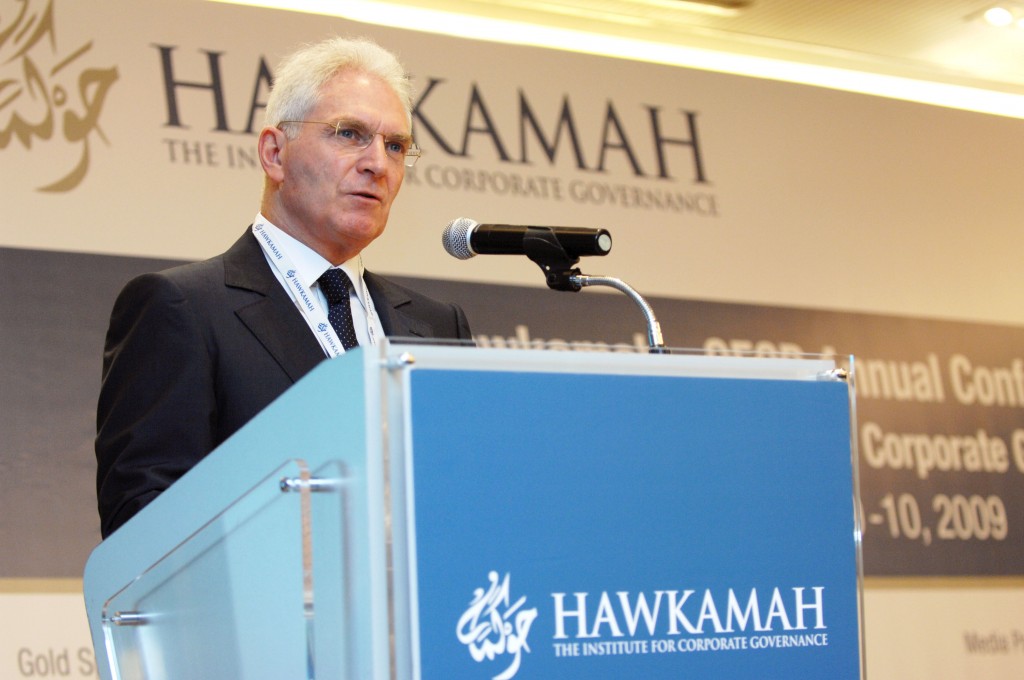
The Fourth Annual Hawkamah-OECD Conference – The Institute of Corporate Governance, which began today in Dubai emphasised the vital importance of creating a culture of corporate governance compliance and enforcement in the Middle East and North Africa (MENA) region.
Delivering the welcoming remarks at the conference, Dr. Nasser Saidi, Executive Director of Hawkamah said: “It is one thing to have regulations issued, it is quite another to have them implemented. Let us not forget that the financial crisis stemmed from markets where the corporate governance codes were the most advanced, but evidently not complied with. The challenge for us here in the MENA now is to create a culture of enforcement and compliance. Indeed non-compliance should be punished. Increasingly, the focus of corporate governance reform in the MENA now needs to be on effective implementation.”
This regional annual gathering, organised by Hawkamah in cooperation with the Organisation for Economic Co-operation and Development (OECD), is being held at the Dubai International Financial Centre (DIFC) from 9 to 10 November, 2009. Regional and international experts on corporate governance are meeting at the event to review the progress in reforming corporate governance frameworks in the MENA region and ways to enhance their implementation.
Dr. Saidi said that market-wide corporate governance improvements do not happen in a vacuum and need to be facilitated and supported by the regulator. “If local capital markets are to grow, corporate governance standards need to be effectively enforced by regulators to give investors the protection required to encourage them to provide capital. This is the time for the regulators to make corporate governance codes mandatory. We encourage regulators, whether bank regulators or capital market authorities, to set up specialist corporate governance departments to monitor the implementation of corporate governance in the entities they are supervising.”
The Executive Director of Hawkamah also stressed on the need for customising international corporate governance frameworks to address the unique needs of markets in the region. He said: “One size does not fit all when it comes to corporate governance. Principles and standards need to be tailored for individual markets and economic activities. However, such standards should be both internationally and domestically credible, given that corporate governance is about attracting international investment, improving the liquidity of our stock markets, and reducing the cost of credit and capital for our companies.”
Maryam Al Suwaidi, Deputy CEO, Securities and Commodities Authority, UAE, who also delivered a Welcome Remark said: “The great significance of corporate governance is well realised and well fostered by regulators in the UAE.” She talked about the Securities and Commodities Authority’s initiative to develop a ‘Corporate Governance Code For Joint-Stock Companies and Institutional Discipline Criteria’ that were consistent with the general corporate governance principles of the OECD and relevant to the social and economic environment of the UAE.
Speaking about the positive response of UAE-based companies to the Code, she said: “Despite the fact that listed companies are given a grace period that ends by April of 2010 to abide by the corporate governance code, many companies have already implemented the provisions of these regulations. Companies have shown great competence in incorporating corporate governance requirements into their articles of association well before the expiration of the established deadline.”
Among the topics that will be addressed by the conference are corporate governance of Islamic financial institutions, insurance firms and the role of private equity firms in corporate governance. In addition, regional regulators are debating the region’s changing regulatory landscape.
An Investors Panel will address the role of investors, both retail and institutional in driving corporate governance reform in the region. Finally, the annual gathering will also feature a closed session for regulators, which will focus on region-specific insolvency and creditor rights issues.
During the Conference, Hawkamah and the MENA-OECD Corporate Governance Working Group with the Union of Arab Banks will be issuing a Policy Brief on Corporate Governance of Banks in the MENA region. Mechanisms for implementing the Policy Brief and ways to advance the corporate governance agenda for state-owned enterprises will also be discussed. In addition, the event will see the release of the Hawkamah/World Bank/OECD/INSOL International, benchmark “Study on Insolvency Systems in the Middle East and North Africa”.
Speakers at the annual gathering include: Mr. Mahesh Uttamchandani, Head of the World Bank Insolvency and Creditor’s Rights Initiative; Dr. Grant Kirkpatrick, Senior Economist at the OECD, Mr. Carl Rosen, Executive Director of International Corporate Governance Network, Mr. Simon Copplestone, Abu Dhabi Commercial Bank’s Board Secretary, and Ms. Sohail Zubairi, CEO of Islamic legal consultancy, Dar Al Sharia. The 200 participants attending the two-day annual meeting include a number of corporate governance experts from across the region.
Fourth Annual Hawkamah-OECD Annual Conference Reinforces Importance of Corporate Governance Enforcement in the MENA region
9 November, 2009
read 3 minutes
Read Next
Media Comments & Quotes
Comments on CSR, Global Post via Xinhua, 19 May 2015
Click here to access the original article, published 19 May 2015; comments highlighted below. Corporate social responsibility
20 May, 2015
MENA Economics
Ethics, Rebuilding Trust in Finance & Some Lessons from Islamic Finance: Speech at EFICA 2014
This keynote address was given at Ethical Finance Innovation Challenges & Awards (EFICA) 2014, organised
30 October, 2014
Media Comments & Quotes
Regulators may be the “new rock stars” but don’t forget the media: The National
[This article by Frank Kane appeared in The National on 18th Feb, 2014. Link to
19 February, 2014



